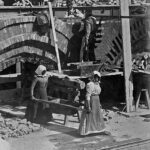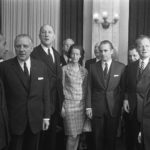Co-Editors: Elisa Fruhauf Garcia, Fluminense Federal Univ., Rio de Janeiro & Emily E. LB. Twarog, Univ. of Illinois
Proposals due: 15.02.2023
This collection of essays takes a global approach to exploring the complexities of the body, gender, and work through the lens of colonialism. By using colonialism as a lens, scholars are able to demonstrate that the experiences of women at work in relation to their bodies forsakes temporality. The editors are seeking scholarship that will take us around the world to investigate the ways in which power, capital, and race impact women’s work experiences in the context of colonialism. Considering different types of colonial and postcolonial societies, the articles will also address the possible connections on the women’s work experience in a long duration.
The essays will be workshopped over the course of two in-person mini-conferences (hybrid is an option of necessary) that will also include a public facing event:
- May 22-26, 2023: Federal Fluminense University, Rio de Janeiro, Brazil
- October 23-27, 2023: University of Illinois at Urbana-Champaign, Illinois, US
- May 2024: Submit full draft to press. The editorsare currently in discussion with two interested academic presses.
The goal of these mini-conferences will be to work collaboratively to create a published collection of essays that are in conversation with one another as well as to build relationships among scholars working in different times and geographies.
Proposals must include: A 500 word abstract; Recent CV; Contact information and affiliation; & Whether or not you are able to attend the mini-conferences in person
Email Proposals to: Elisa Fruhauf Garcia, elisagarcia@id.uff.br and Emily E. LB. Twarog, etwarog@illinois.edu
Source: H-Net Notifications

 Workers of the World: International Journal on Strikes and Social Conflict
Workers of the World: International Journal on Strikes and Social Conflict  Sammlung Frauennachlässe am Institut für Geschichte der Univ. Wien
Sammlung Frauennachlässe am Institut für Geschichte der Univ. Wien  Nordico Stadtmuseum Linz
Nordico Stadtmuseum Linz  International Conference of Labour and Social History (ITH)
International Conference of Labour and Social History (ITH)  Institut für Zeitgeschichte der Universität Wien, Reihe „INTERAKTIONEN“
Institut für Zeitgeschichte der Universität Wien, Reihe „INTERAKTIONEN“